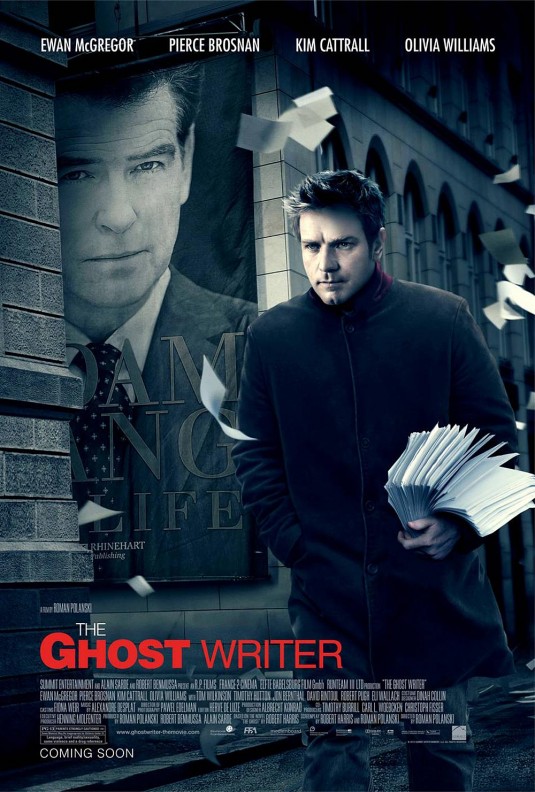Status: In limited release (opened 3/19/10)
Directed By: Roman Polanski
Written By: Robert Harris and Roman Polanski
Cinematographer: Pawel Edelman
Starring: Ewan McGregor, Kim Cattrall, Pierce Brosnan, Olivia Williams
When it comes down to it, The Ghost Writer is a movie about a guy writing a book, and for the most part it’s as unexciting as that sounds. There are several scenes of the unnamed titular character (Ewan McGregor) interviewing his subject, a former British Prime Minister named Adam Lang (Pierce Brosnan). These are charming and intriguing at times—mostly because it’s usually fun to watch two Brits banter with each other—but for the most part it’s about what it sounds like: two guys sitting in a room talking while one of them takes notes. The film has aspirations of being a political thriller, but it takes so long getting to the thriller part that it’s hard for an audience to feel involved by the time it comes around.
It starts off intriguing enough. The former “ghost” (a term I’m pretty sure isn’t actually used outside of this movie) turns up dead, and it’s unclear if it’s the result of a suicide or foul play. Just as McGregor’s character agrees to pick up where his predecessor left off, rumors begin to swirl of charges being brought against Lang for committing crimes against humanity during his tenure as PM. This is all a very thinly-veiled commentary on the current political climate and the war on terrorism, so thin in fact that I found it to be pretty annoying. McGregor eventually uncovers, for instance, some shady dealings involving a defense contractor called something along the lines of Hallibuckton. Brosnan’s former PM is, of course, a transparent allusion to Tony Blair, down to his all-too-friendly relationship with the U.S. The screenplay has a little too much fun with this, sacrificing credibility for winking real-world references every chance it gets.
As news of the charges circulates in the media, the Lang clan takes up in an island estate just off the coast of Massachusetts. (I didn’t catch the island’s name, but it’s probably Nantucket, or something like it.) There, the “ghost” finds himself embedded with Lang, his wife Ruth (Olivia Williams), and his assistant—and implied mistress—Amelia (Kim Cattrall). There’s a very slow build of a conspiracy at play, and McGregor, after an agonizingly long period of inaction, finally sets out to uncover some additional clues of his own and get to the bottom of exactly what’s going on with Lang and his legacy. This finally allows Roman Polanski, who in his prime was a master of subtly-built tension, to show what he’s good at. There’s a scene with McGregor following a GPS’s hauntingly unemotional voice to a pre-programmed destination of which he is not aware that recalls Jack Nicholson cautiously driving through the seemingly-innocuous orange groves north of L.A., and it’s nearly as effective. In fact, Polanski throughout The Ghost Writer seems to be trying to hit several of the same notes he played so successfully in Chinatown—his masterpiece—but here he doesn’t have the same quality of backing story to supply enough gravitas to such sequences. The film’s final shot, for instance, would be a brilliantly haunting image, the kind that leaves the audience ambling out of the theater in stunned silence, but for the fact that by the time Polanski establishes it, we don’t really care.
This is due to The Ghost Writer‘s biggest storytelling flaw, which is that after spending 2 hours slowly and painstakingly establishing the what of its mystery, and building the clues surrounding it to a point where we’re able to piece them together along with the protagonist, it all of a sudden becomes The Da Vinci Code, resorting to a cheesy, contrived, and completely unnecessary device to tie things together. It’s frustrating to see a movie go to such lengths to tell an adult story, and to attempt to handle it maturely, only to eschew it so readily for a cheap and unsatisfying payoff.
That’s not to say that the annoying twist is the only shame in this endeavor. The story is way too slow, too drawn out, and not significant enough to warrant the amount of care Polanski uses in his deliberate telling of it. I could see some people enjoying this film, becoming engrossed in its minute details as it ambles along towards its less-than-shocking finale, but I think most audiences are more likely to be as I was—thoroughly bored with waiting for something to happen, to the point where I almost failed to notice it when something finally did. I can imagine the novel working, but it doesn’t seem to translate very effectively to the big screen.




